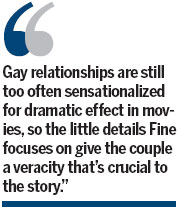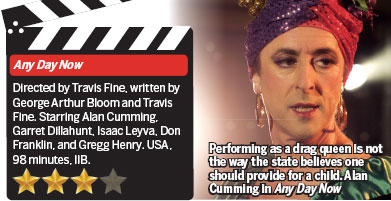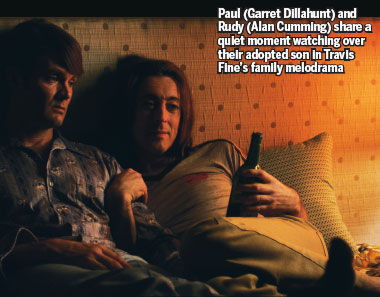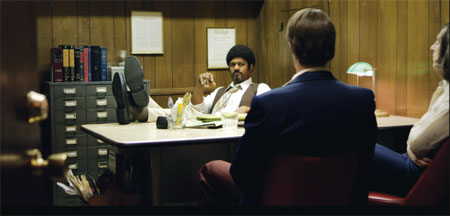The ties that bind
Updated: 2013-10-11 06:59
By Elizabeth Kerr(HK Edition)
|
|||||||||
Currency and a trio of strong characters save a soapy drama from falling into an abyss of sentimentalism. Elizabeth Kerr reports.
Though popular media make it seem like LGBT marriage equality and family rights are new things, they most certainly are not, and there have been court fights, at least in North America, over the subject of adoption since the 1970s. The contentiousness of those who believe having gay and lesbian parents is bad for kids and those who don't means the argument is going to stay alive for many years to come. So, given the currency of the subject, the question is why writer-director Travis Fine didn't update the (allegedly) true story at the center of Any Day Now. The answer is, he didn't need to: leaving the film set in the late-'70s makes it clear just how little progress has actually been made. And it gives the movie a better soundtrack.
The story begins with drag queen and aspiring singer (Alan Cumming, The Good Wife) hitting the stage for his nightly act in a seedy West Hollywood club. It's the height of the disco era, but homophobia is alive and well and all around Rudy. One evening, a straight-laced, clean-cut business type comes into the bar and there's an instant connection with Rudy. He's Paul (Garret Dillahunt, Looper, Terminator: The Sarah Connor Chronicles), a lawyer with the district attorney's office, as deep in the closet as Rudy is out and proud. It's love at first sight and before you can say U-Haul they're living together at Paul's home - with a 14-year-old Down syndrome boy, Marco (Isaac Leyva). When Rudy's junkie neighbor gets arrested in a sting, Rudy feels compelled to look after the neglected boy, which eventually turns into a petition for full custody.

If that sounds like the makings of a good made-for-television tearjerker then that's because it is. But that doesn't make Any Day Now less affecting or relevant in its under the radar way. The film has its share of big moments and acting, but the surprisingly multi-layered core story manages to leave room to explore the idea of connection through otherness and challenge our collective unwillingness to alter the working model of family. There are gaps in character development that make suspension of disbelief compulsory (chiefly why Paul willingly jeopardizes his career to help Rudy and Marco) but that's easily done because Cumming, Dillahunt (who really needs to be in all movies, all the time) and newcomer Leyva do such an outstanding job of giving life to the characters and realizing a believable relationship. Gay relationships are still too often sensationalized for dramatic effect in movies, so the little details that Fine focuses on (prosaic breakfasts, playful swats, affectionate tongue-free kisses) give the couple a veracity that's crucial to the story. Their brutal honesty at how the world views them as well as Marco forms the thread that ties the story and its themes of acceptance of otherness together.
As we all know, however, no made-for-TV tearjerker would be complete without tragedy, and Any Day Now's final act delivers. Faced with losing custody of Marco because his mother decides to re-exert her parental rights - at the urging of Paul's old boss, DA Wilson (Chris Mulkey) - Rudy and Paul try one last lawsuit, but Marco winds up back with mom. When Marco repeats, "This isn't my home," over and over from the back seat of a car outside her less than welcoming apartment it drives Fine's point home with all the subtlety of a sledgehammer but never stoops to preaching. It also jerks a few tears.
Any Day Now opened in Hong Kong on Thursday.
|
Every civil rights issue needs its mouthy advocates, and Any Day Now's crusading lawyer is Lonnie Washington (Don Franklin) |


(HK Edition 10/11/2013 page7)
